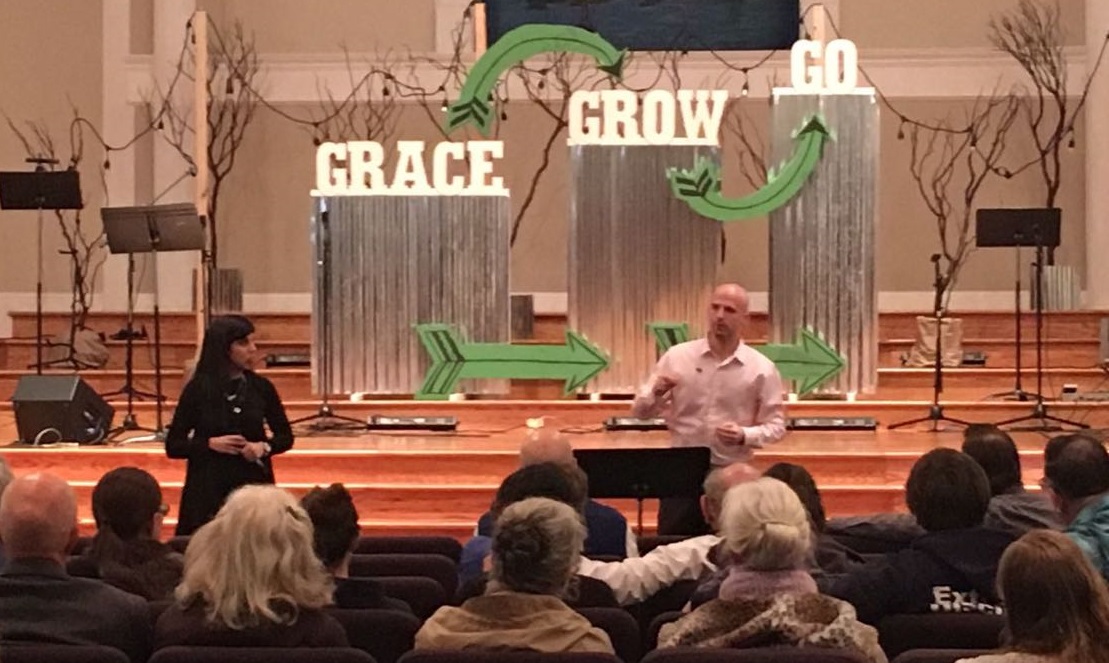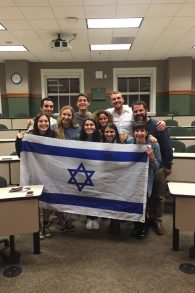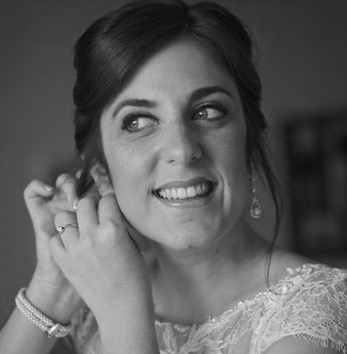
This is the 9th year of the “Between The Lines: Voices From Israel: Stories Untold” tour (formerly the “Israeli Soldiers Tour”.) This project is one of the most significant counter-attacks of the notorious “Israeli Apartheid Week,” where false information about Israel is being spread by haters across North America college campuses.
This tour, organized by the pro-Israeli nonprofit organization, StandWithUs, brings 12 reserve duty Israeli soldier-students to thousands on North American campuses, high schools, churches (including Hispanic), synagogues, community events and through the media.
During the tour, they related their personal experiences serving in the Israel Defense Forces (IDF) upholding its strict moral code, often in the face of an enemy that hides behind its civilians. Their stories from Gaza, the West Bank and Syria have never been heard before.
StandWithUs “Between The Lines” tour puts a human face to the IDF uniform, thus trying to combat the demonization of Israel and Israelis led by anti-Israeli movements, such as the BDS (Boycott, Divestment, Sanctions.) Their in-front-of-the-lines-and-behind-the-headlines stories, which have never been heard before, try to depict the more accurate, more balanced, reality in Israel.
Itay and Ilan (Last names are withheld for security purposes) have recently returned back home from their tour, and agreed to share their experiences, the good and the bad, with us.
Itay is studying political science and communications at Bar Ilan University. He served in the IDF for five years as a human resources officer. His most recent role was in the Medical Corps where he continues to serve in his reserve duty.
One of Itay’s roles was to coordinate the construction of a field hospital to treat those wounded in the Syrian conflict. In addition to his studies, Itay works for the Ministry of Tourism as an assistant spokesperson and social media manager. In 2015, he participated in the Israeli delegation to South Korea as a part of the “Intergovernmental Youth Exchange Program.”
Ilan extended his Israeli Soldiers tour by speaking to Latino groups in Miami, Florida and then, in Mexico. Born in Venezuela, he moved to Israel in 2010. Ilan’s father is a Christian Venezuelan and his mother is the daughter of a Holocaust refugee. His home, education and life have always been an example of multiculturalism and coexistence.
Ilan served in the Humanitarian and Civil Affairs Unit in the IDF, also known as COGAT. During his service, Ilan worked with Palestinian civilians and representatives in projects focused on improving the life of Palestinian families.
Itay spoke in Northern California and the Pacific Northwest together with Yuval. Ilan, who is also Director of StandWithUs Espanol and Mark traveled the Southeast. The reservists were met by inquisitive audiences and an array of questions about Israel and the IDF. But, every year, Students for Justice in Palestine (SJP) stage a protest and for the second time, the University of Georgia was the target. Ilan and Mark persevered and The Atlanta Jewish Times was present.

Why do you think it’s important to tell your stories as IDF soldier on campus?
Itay:
It’s important to know what the IDF is REALLY all about: people who are defending their country but at the same time willing to help and treat anybody who needs it –- even people we may consider to be our enemies or they may consider us to be their enemies. The students we address are not necessarily aware of this.
The medical corps constructed a field hospital to treat the wounded from the Syrian civil war on Israel’s northern border. Thousands of Syrians received medical care that no one else offered them but Israel. The same happened in 2014 near the Gaza strip, only there Hamas denied its own people access to the hospital and the medical care that was offered to them. They even targeted the hospital with projectiles.
It is also worth noting that the IDF provides humanitarian aid not only in Israel’s region, but in the entire world: Turkey, Japan, Philippines and Haiti are just recent examples from the last years where our medical forces combined with search and rescue teams were sent to help in disaster struck areas.
Ilan:
I think it’s very important for people to have an opportunity to meet an Israeli and hear the reality from someone who actually lives there.
As a Venezuelan, I always wondered what the people from Israel think about the situation. Now, I have the opportunity to share my story – my Israel story – with people in other countries.
We realized that pro-Israel students need to hear our experiences, to receive more accurate information, and to build a connection to Israel through them.
Who are you aiming for? Who is the target audience you want to reach?
Ilan:
During this tour, I had the opportunity to read every kind of audience: Jewish and non-Jewish, students who have never heard about Israel in their lives, anti-Israel students, Christian leaders, community members, etc.
I think we have an important message to transmit to everyone, but I was especially excited to address people who were hearing about Israel for the first time in their lives.
How do you react to people showing you videos of Israelis criticizing Israel, especially with extreme left organizations like “Breaking the Silence” sharing testimonials by soldiers, which sometimes seem to steer from reality?
Ilan:
In Georgia, we had an anti-Israeli protest. Approximately 20 students rejected dialogue after hearing my experiences of cooperation between Israelis and Palestinians. They were so blinded by their hatred of Israel, that they didn’t realized they were violating the memory of their own victims. When we asked them to respect human life and not throw pictures of victims on the floor, they started placing them on tables.
To them and every other protester I say: the only path to peace is if we meet and discuss. Groups who decide to take unilateral actions, obstruct justice and eliminate responsibility from one of the parties, are not contributing to peace but encouraging hate.
Itay:
Criticism is important for every organization, including the government and the military in order to minimize errors, form new rules, improve for future times and hold people accountable for their actions.
That being said, the actions of ‘Breaking the Silence’ suggest nothing of the sort. They are promoting a political agenda under anonymous testimonies which cannot be verified. Even channel 10 television – which is very critical of the current government policy – investigation revealed that out of ten testimonies, only two were completely accurate. The others were impossible to verify, not true or overly exaggerated. Unfortunately, these testimonies are being used abroad for the sole purpose of smearing Israel and the IDF.
Add that to the fact that they are being funded by European countries and organizations with a similar agenda and with an expectation that their money will provide results – it is very hard not to question not only their actions and goals, but the content of their material.
I ask you to remember one of Winston Churchill’s finest quotes, “When I am abroad, I always make it a rule never to criticize or attack my own country. I make up for lost time when I come home.”
What is Israel to you, and how do you pass this message to students abroad?
Ilan:
For me Israel is an inspiration. It’s a country built by immigrants and minorities, built on the values of multiculturalism and coexistence….a country that helps others.
When I sought a way to transmit what I feel, I realized that sharing my daily dilemmas, the decisions and opportunities as an Israeli and especially an IDF soldier, was actually a good way to present Israel, the complexity of the Middle East and the incredible story of achievements of the Jewish people.
I think, people relate to Israel today because of its story of overcoming every single obstacle, and growing stronger every time. Our task is to create a connection between people’s every day obstacles, and Israel.
Share one of the most memorable moments from your recent tour.
Itay:
We were speaking in the Napa Valley, California. During the Q&A, an 11-year-old wondered why we help those who have hurt us in the past, seek to hurt us today, hate us and view us as their enemies.
I explained that first and foremost, we are not fighting the people and we should separate them from their leadership. – even though they are taught to hate us. Why? Because we need to achieve the higher moral ground. That doesn’t mean there aren’t people who hate or teach hatred, but they are NOT the majority in Israel.
The true nature of a society is not determined by its extremists, but by its majority. Unfortunately, that’s the difference right know between the Palestinian and Israeli societies. I hope that one day we’ll see a change within the Palestinian education system. It’s an important element towards achieving peace.
Second, to achieve that higher moral basis, our values cannot be empty slogans. While some of our neighbors glorify martyrdom and death, we say we praise the value of life. We should transform our beliefs into actions, otherwise they don’t mean anything. This is our message of hope for peace. Yes, you may have hurt us in the past, but we are willing to overcome it even though it still hurts. Our hand is reaching out for a better future.
Ilan:
In Jacksonville, Florida, we shared our story in a school located in a dangerous area. We talked about the second Intifada and how Israel dealt with violence, and asked the students if they knew or, were ever affected by violence? Every one of them raised their hands. As sad as that was, we created a connection between them and Israel by how we – and they – overcame violence.
How do you react to people showing you videos of Israelis criticizing Israel, especially with extreme left organizations like “Breaking the Silence” sharing testimonials by soldiers, which sometimes seem to steer from reality?
Seeing the growing wave of anti-Semitism, do you believe history can repeat itself?
Itay:
It is well known that those who don’t learn from history are doomed to repeat it. Unfortunately, the recent despicable anti-Semitic attacks are not new to our people.
Anti-Semitism is almost as old as our religion exists. I cannot foresee the future, but I know that much has changed throughout the years:
For one, there wasn’t a Jewish state back then. There is a reason why our army was named “Israeli Defense Forces” – its purpose is to protect the Jewish people in their ancestral homeland. It’s important to understand that Israel is the home for every Jew around the world, even those who don’t live in Israel. It is a part of our responsibility because of the horrific past our people have endured.
That leads me to my second point which is: I believe most Israelis and Israel’s government condemn every act of anti-Semitism. We’re encouraging our allies around the world to denounce it and act against it. The Jews in the Diaspora are not alone and will never stand alone. I was moved by the actions VP Mike Pence took when he visited one of the vandalized cemeteries and by British PM Theresa May’s statement about anti-Semitism. Fortunately, they are not the only world leaders who condemn these kinds of actions.
Anti-Semitism is an old disease, and similar to many others, it might not perish completely from this world. That doesn’t mean we won’t fight against it wherever we encounter it.
Ilan:
I think the ideas that generated the Holocaust are still around us, and the line between an idea and a reality is very thin. StandWithUs believes that education is the path to peace. I think education is the only way to stop hatred from spreading worldwide.























 More news and opinions than at a Shabbat dinner, right in your inbox.
More news and opinions than at a Shabbat dinner, right in your inbox.